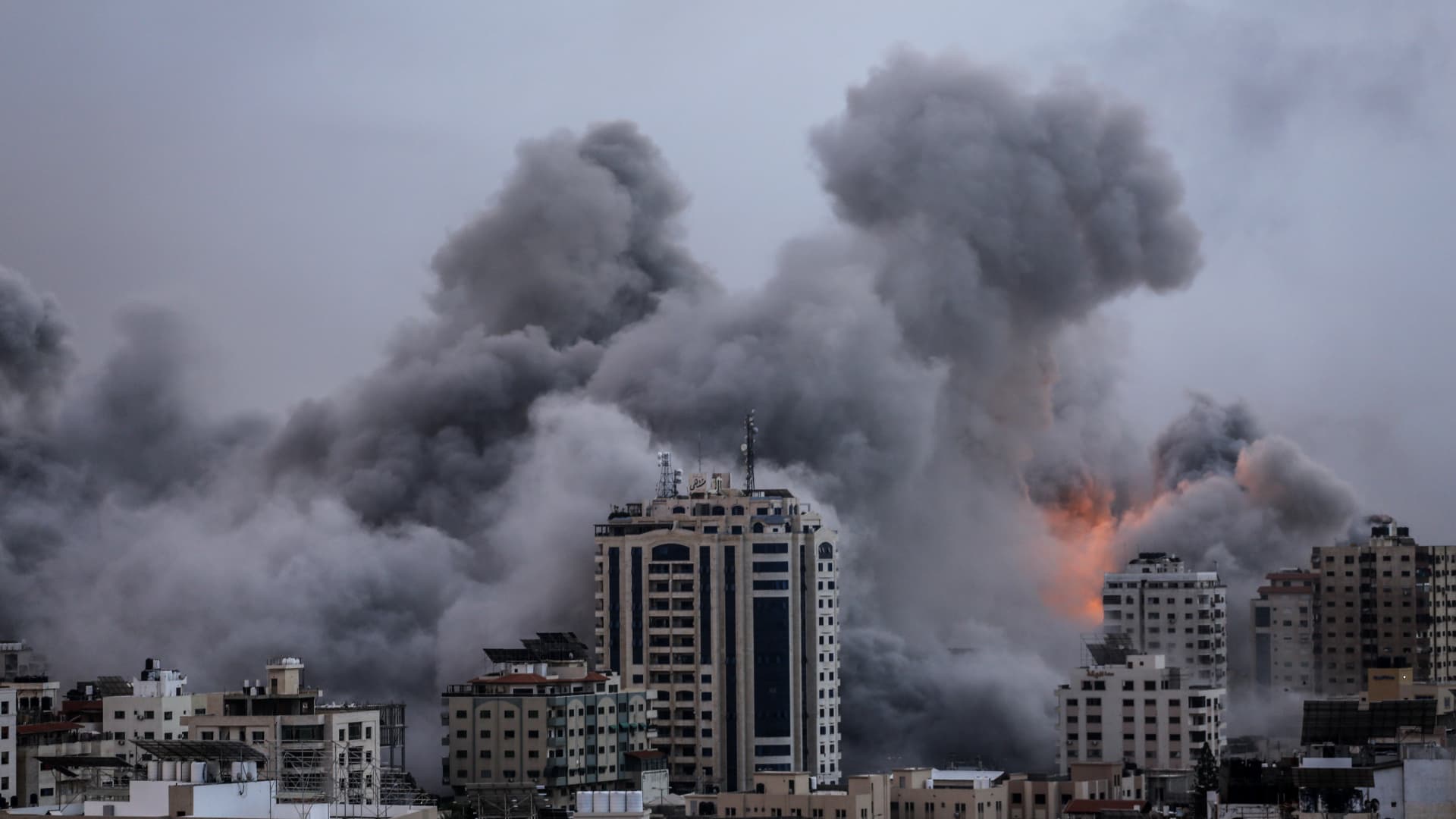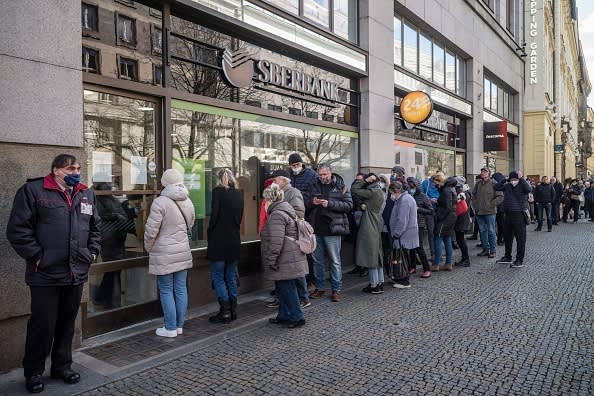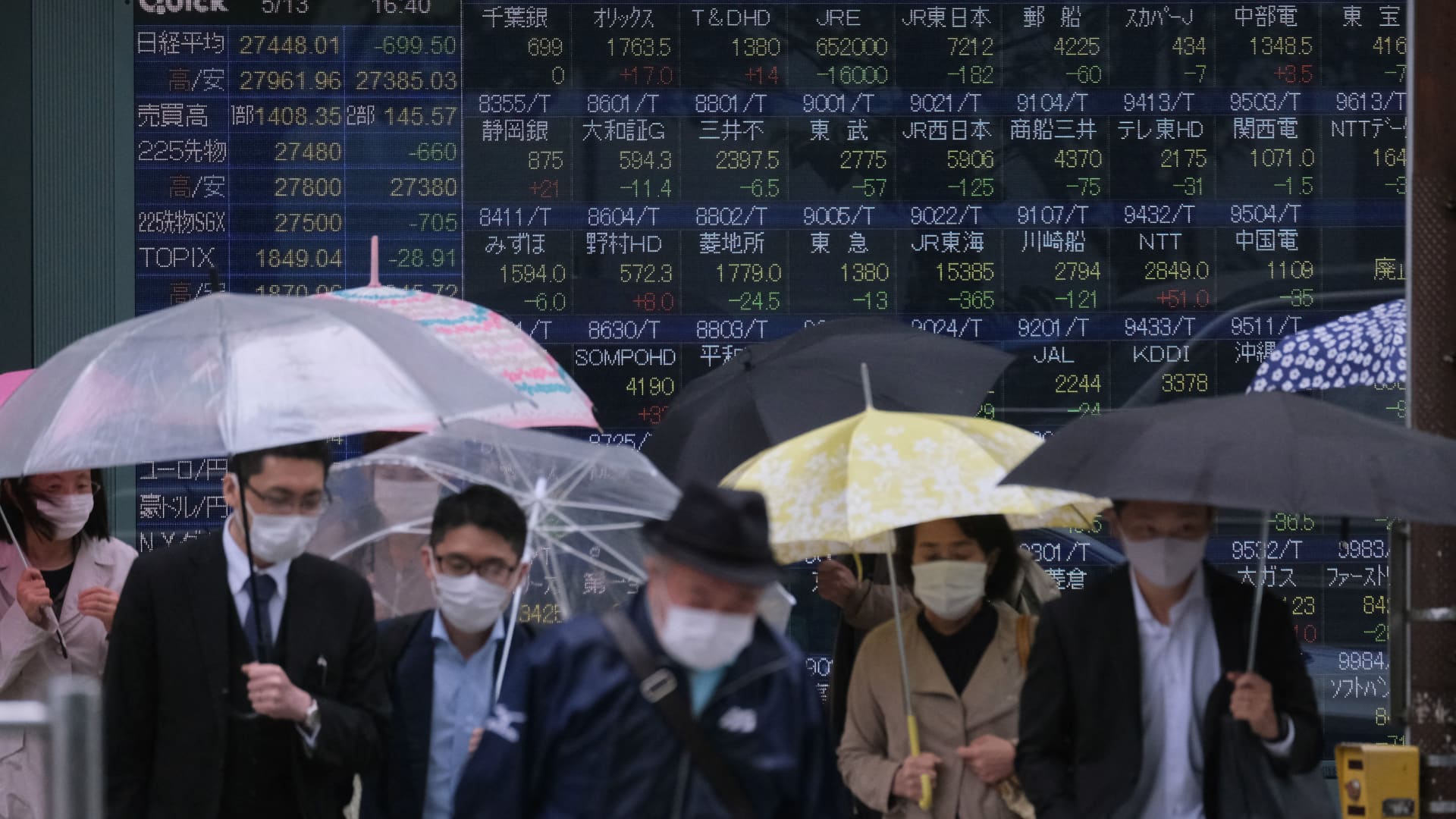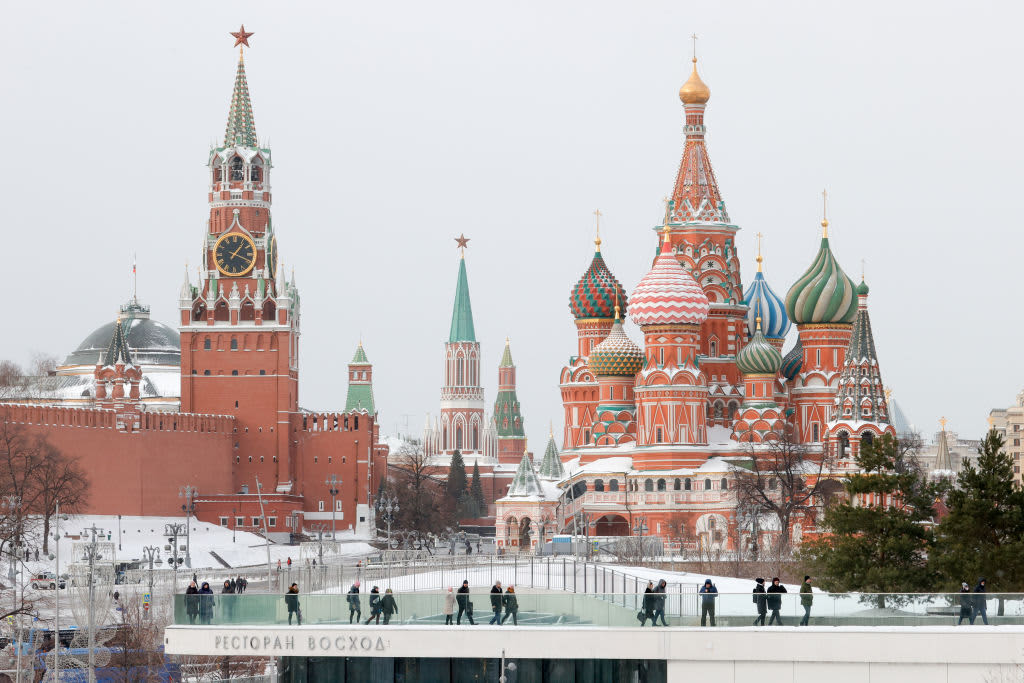An 'extended war'? Markets may be underestimating the Israel-Hamas conflict
While market reactions remain muted following a modest rally, some industry watchers caution that several risks have yet to be fully priced in.

Smoke rises over a buildings in Gaza City on October 9, 2023 during an Israeli air strike.
Sameh Rahmi | Nurphoto | Getty Images
While market reaction remains muted following the attack on southern Israel by Palestinian militant group Hamas, some industry watchers caution that several risks resulting from the conflict are yet to be fully priced in.
"Any extension of the war will likely fan fears of oil supply disruption and further demand for safe-haven assets such as gold, the U.S. dollar and the Swiss franc," analysts at BNY Mellon said in a research note Tuesday.
At dawn on Saturday following a major Jewish holiday, Hamas launched a multi-pronged infiltration into Israel — by land, sea and air. The attack came hours after thousands of rockets were sent from Gaza into Israel.
The playbook of flocking to safe-haven assets is not new in times of conflict. Oil prices jumped 4% on Monday before shrugging off those gains in subsequent sessions, and gold prices have inched higher by a little over 1% since the attack. Yields for benchmark U.S. Treasurys have dropped around 13 basis points to 4.657%.
But some market participants are not expecting this to be the end of the volatility.
Israel has room for a 'long conflict'
Israel's budget and GDP have room for a "long conflict," which could allow the country to sustain an "extended war" for over eight weeks, said BNY Mellon's head of markets strategy and insights, Bob Savage.
"Global markets have yet to fully price the inflation risks from developments — from higher oil prices and more defense spending," Savage cautioned. He added that the issue of providing foreign aid to Israel is also likely to surface.
He spotlighted that a looming global issue as a result of the Israel-Hamas conflict, on top of an ongoing Ukraine war, is the push for further military spending globally: "The consequences of which would see further drawdowns in savings [and] higher interest rates."
In 2022, the world's military spending expanded for the eighth consecutive year to a record high or $2,240 billion, data from the Stockholm International Peace Research Institute showed. Additionally, ever since Moscow's invasion of Ukraine, the U.S. sent over $75 billion in assistance to Kyiv, a figure which towers over that of other recipients of U.S. aid.
Israel's Iron Dome anti-missile system intercepts rockets launched from the Gaza Strip, as seen from the city of Ashkelon, Israel October 9, 2023.
Amir Cohen | Reuters
"This raises the issue of real rates [rates adjusted for inflation] and, as we learned from markets in 2008, a 2.5% 30y real rate level is usually a trigger for 'breaking something,'"' Savage continued.
Aside from inflationary pressures, a risk that a wider conflict could conflagrate still looms. The unprecedented nature of Hamas' assault has raised concerns that Iran may have been involved, given Tehran's long-time support for Hamas and its cause. Should that be ascertained, especially by western countries, the escalation of the war would be imminent, most analysts believe — which could put the markets into risk-off mode.
"It's all about Iran. Will we see Israel or the United States publicly accuse Iran of direct responsibility for this? That would cause the premium [of oil prices] to go higher," said Rapidan Energy Group's President Bob McNally.
He added that Iran's involvement is also going to be a cause for a safe-haven flight into the dollar. "It's bad for fragile economies, fragile currencies. Bad for energy prices," McNally said, adding that it is the "last thing" that economic agents need as markets try to navigate a soft landing.
The most extreme scenario involves Israel striking Iran's nuclear facilities. This could spike oil prices well north of $150 per barrel.
"This is going to be a prolonged and very difficult, and probably bloody war," he said.
Iran's mission to the United Nations has denied Tehran's involvement in the militant group's attack on Israel. U.S. Secretary of State Antony Blinken said Sunday on CNN's "State of the Union" that the U.S. had "not yet seen evidence that Iran directed or was behind this particular attack, but there is certainly a long relationship."
Global investment research firm Alpine Macro echoed that while the conflict's course is uncertain, it will "very likely escalate" and possibly contribute to a "significantly risk-off global environment" over the next one to three months. A risk-off environment is denoted by investors flocking to bonds and gold, as well as the selling of stocks.
The report cited that a top risk would be Israel targeting Iran's nuclear program and escalating the conflict regionally to disrupt oil export from the Persian Gulf, and thereby pulling the U.S. into the fray.
"The most extreme scenario involves Israel striking Iran's nuclear facilities. This could spike oil prices well north of $150 per barrel," Alpine Macro said in a note following the incursion.
At the time of publication, at least 900 Israelis have reportedly died, according to NBC News. The Palestinian Health Ministry, meanwhile, has recorded 830 deaths so far.
Markets may also ignore conflict completely?
One analyst is of the view that even if the conflict prolongs, its implications on global markets is still largely contained.
"I believe that markets will ignore this conflict completely, so the conflict will have no bearing on markets eight months from now," Marko Papic, partner and chief strategist of Clocktower Group told CNBC via email. He added that Israel would have the funds needed to last "much longer" than eight months given how it can access international debt markets.
Palestinian members of the al-Qassam Brigades, the armed wing of the Hamas movement, take part in a gathering on January 31, 2016 in Gaza city to pay tribute to their fellow militants who died after a tunnel collapsed in the Gaza Strip.
Mahmud Hams | Afp | Getty Images
Markets should remember that the Israeli-Palestinian conflict has not been market relevant since 1973, Papic affirmed, adding that he believes this will remain the case going forward given how he deems Hamas' actions to be a terrorist attack, and not one that can "threaten Israel existentially."
Hamas has been designated a terrorist organization by the U.S., Japan, Australia, Israel, the European Union and many other countries — although some only apply this label to its military wing.
And while Papic acknowledged that markets have not fully priced in inflation risks, he maintained it has nothing to do with the Israel-Hamas war, but rather a mix of strong consumer spending in the U.S., labor shortages and a global capital expenditure cycle, among other factors.
He added that talking about the Israel-Hamas conflict "as a contributor to inflation is, in this context, ludicrous."

 Kass
Kass 
































